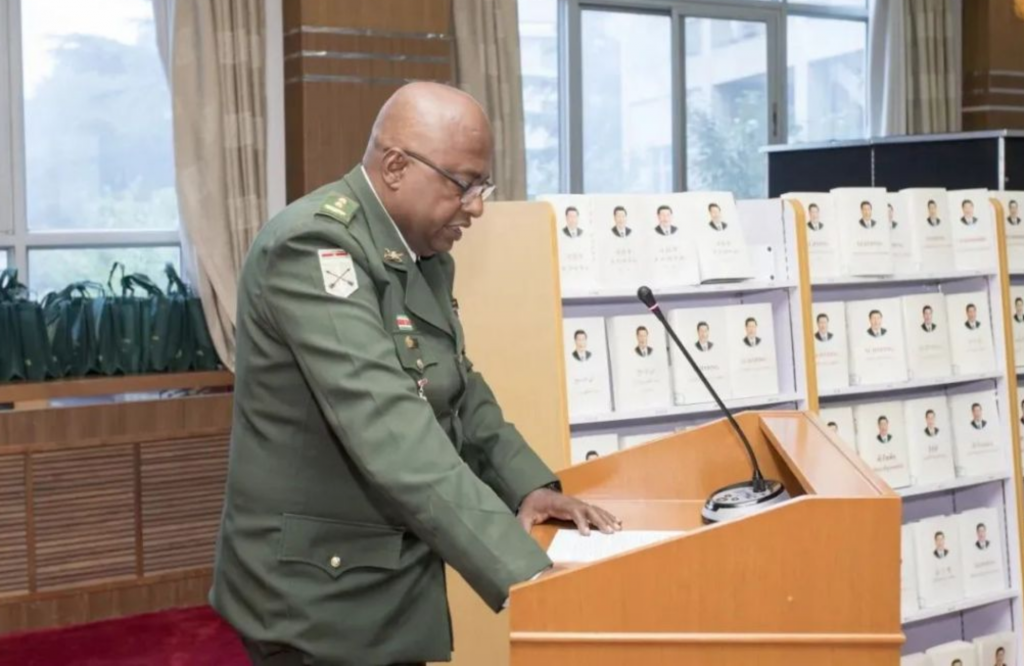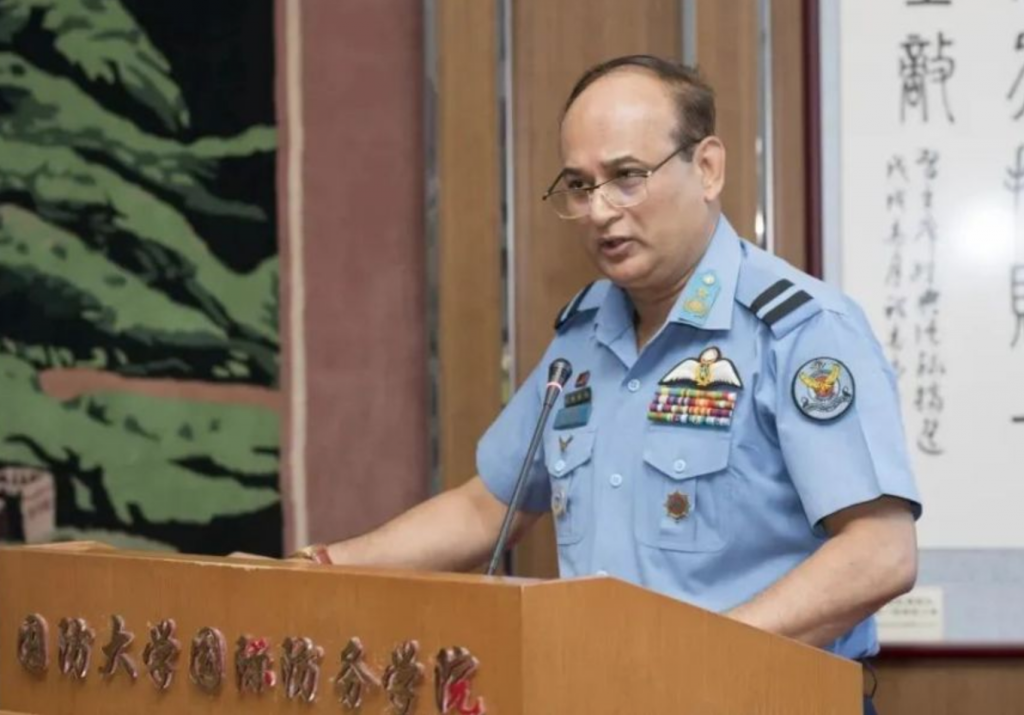Headlines and Hashtags
Foreign Generals Nod to Xi's Ideas
Since late June, state-run media have promoted the publication of the English-language edition of the third volume of Xi Jinping: The Governance of China, the book series purporting to distill the ideas driving China’s top leader. Like the volumes preceding it, this book was published by the Central Propaganda Department of the Chinese Communist Party and the Information Office of the State Council (essentially a single office) in cooperation with the China International Publishing Group (CIPG), a CCP publishing arm that is now a sprawling global media company.
We won’t dredge through the content of the book here, which covers Xi Jinping’s reports, speeches, important pronouncements and so on between October 18, 2017, marking the closure of the 19th National Congress of the CCP, and January 13, 2020. We will only note that the book includes just two documents from 2020, both pre-dating the formal start of China’s national-level response to the COVID-19 epidemic on January 20, and the closure of Wuhan three days later. These were the January 8 speech Xi gave to a joint study session on “not forgetting to original intention, keeping to the mission” (essentially about CCP internal unity and governance, and the need to protect the “core” status of Xi himself), and the January 13 speech Xi gave to a top-level meeting on discipline inspection within the CCP (ostensibly about “checking and monitoring the exercise of power”).
We can imagine that if a fourth volume of Xi Jinping: The Governance of China can be expected between now and the 20th National Congress of the CCP in 2022, it will do a great deal of boasting about China’s response to COVID-19, playing up its global leadership. Volume three of Xi Jinping: The Governance of China – let’s just call it TGC 3 for short – was actually released in late March this year, but seems not to have been promoted too loudly at the time, likely because the pandemic response by that time dominated the agenda.
Moving on from its tinder-dry piling up of Xi’s past pronouncements, what is most interesting about TGC 3 is the way it is being used both as a vehicle to promote China’s policies internationally, and (perhaps more importantly) as a tool to signal internally the international acceptance of Xi’s ideas and policies.
Over the weekend, the China Foreign Languages Publishing Administration, this being just another name for the China International Publishing Group, released an article – shared also through the “Study Xi Strong Nation” app – highlighting a July 27 roundtable discussion held at the International College of Defense Studies, a college within the PLA-run National Defense University that seeks to “provide international advanced professional military training and to carry out defense-related exchanges.” The roundtable discussion was framed as an opportunity for foreign military leaders and senior Chinese officers to come together to “discuss their experiences” in studying TGC 3.

We are told in the report that 50 “high-level military officers” from China and 29 foreign countries came together for the roundtable discussion, in order to “deepen their understanding and familiarity with Xi Jinping Thought on Socialism with Chinese Characteristics for the New Era,” as well as reach “further consensus” on the promotion of the Belt and Road Initiative and the building of a “community of common destiny for mankind.”
Foreign attendees, we are told, included military officials from Iran, Suriname, Bangladesh, Sierra Leone, South Sudan, Togo and Fiji. A full list of participants is not provided.
Interesting, though not surprising, is the fact that no substantive defense or other matters are mentioned, even in passing, in the report about the meeting. There is no talk, for example, of COVID-19, or of the Iran-China partnership. The result is an odd appropriation of foreign military figures with the apparent primary objective of signaling the importance of Xi Jinping terminologies and concepts, even in ways that have no clear or justifiable relevance to foreign countries or military leaders at all.
The most outstanding example occurs as a Bangladesh air force general is quoted as saying: “Only through a deep reading of this book can foreigners understand the relationship between the ‘Four Consciousnesses’ and the ‘Four Self-Confidences’ and the governing of the nation, and only then can they better understand China’s success and what stands behind that success, the Chinese Communist Party.”
As we outlined in the CMP report on political discourse in 2018, the “Four Consciousnesses” and “Four Confidences” are phrases critical to the consolidation of Xi Jinping’s personal power at the leader of the Chinese Communist Party. The former refers to the 1) need to maintain political integrity, 2) think in big-picture terms, 3) uphold the leadership core, and 4) keep in alignment with the CCP’s central leadership. The “core” is of course a reference to Xi Jinping, who was designated formally as the “core” leader in 2016. The “Four Confidences” refer to 1) confidence in the path of socialism with Chinese characteristics, 2) confidence in the theories of the CCP, 3) confidence in the system (meaning the system of governance of the CCP), and 4) confidence in China’s unique civilization.
The above-mentioned phrases are generally bound together with the so-called “Two Protections: 1) protecting the core status of General Secretary Xi Jinping, and 2) protecting the central, unified leadership of the Central Committee of the CCP. Together, these three phrases form what is called the “442” formula, now used to signal loyalty to Xi Jinping and his leadership of the CCP.
It is odd, to say the least, to hear this language of internal loyalty signaling from a Bangladeshi general.

Predictably, many of the remarks quoted from foreign military officials follow familiar themes in Chinese foreign policy. China is committed to standing up internationally for developing nations, and doing its utmost to promote mutual development opportunities for all. This is linked to its commitment to fight poverty. And of course, China insists on the principal (if not necessarily the practice) of non-interference in its foreign policy.
A general from the Republic of Sierra Leone reportedly told those gathered: “China’s major diplomatic policy of building of a community of common destiny for mankind aims to share China’s experiences and resources with developing nations and the world. It opposes imposing its will on others, and opposes bullying of the weak.”
A military representative from Suriname reportedly said: “In the process of fighting poverty, the leaders of the Chinese Communist Party have created strong social synergies, and gathered forces from all corners of society, including private enterprises, to jointly fight poverty, forming a unique institutional system to fight poverty.”
Meanwhile, a general from South Sudan, where China has in recent years had deeper involvement (confronting the “inherent limitations of its traditional hands-off foreign policy posture”), focused on the need for continued security aid from China: “Xi Jinping’s work talks about using the ‘Belt and Road’ to promote the peaceful development of developing nations, and I have deep experience of this. I propose that China deepen its security aid to friendly nations, in order to ensure the security of the global community of common destiny for mankind.”
Also noteworthy is the fact that we are told that speeches delivered by Chinese military officers present at the roundtable including the topic of “Xi Jinping Thought on Diplomacy” (习近平外交思想). Here again we have reference to shortened permutation of Xi Jinping’s banner term, which can be seen as part of the evolution toward the ultimate positioning of a “Xi Jinping Thought,” putting Xi on virtually equal ideological footing with Mao Zedong.






















